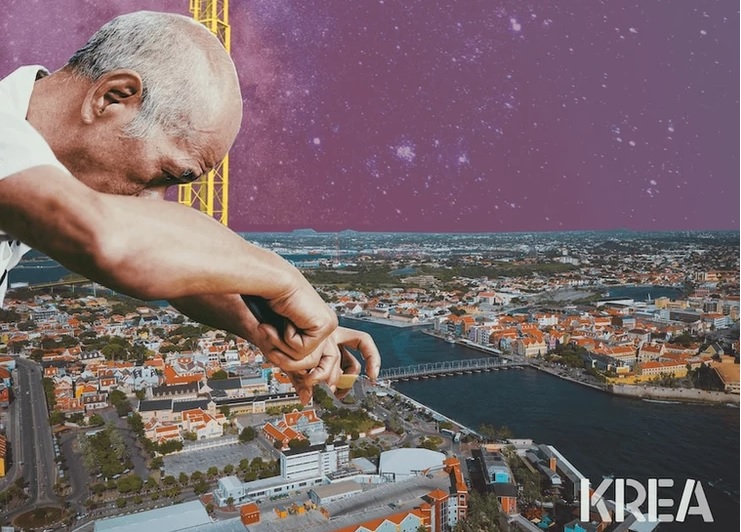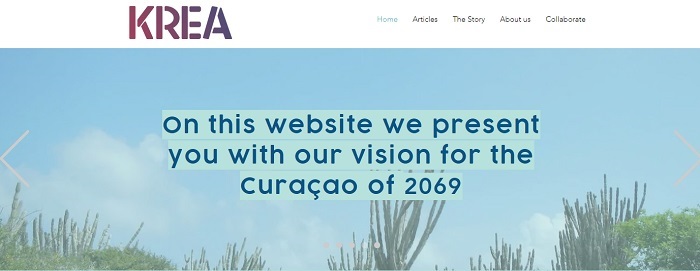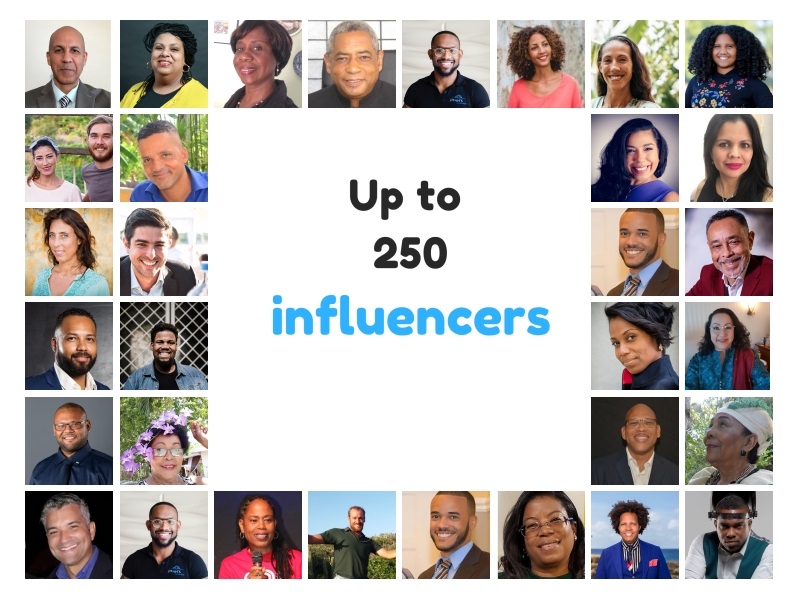Influencers KREA: building Curaçao of the future
Interview December 2020

Could you introduce yourselves as you present yourself as a collective, not as individuals?
‘KREA’ is a collective of young engineers from Curaçao descent that teamed up and we present ourselves as a multidisciplinary team. We collaborate together to help to create a future proof and sustainable Curaçao. We consist of 6 members representing these disciplines: Information Technology, Built Environment, Energy & Sustainability, Transport & Mobility and Design & Interaction.
Why is it that you present yourself as a collective?
We became aware that there are possibilities to offer solutions for challenges that Curaçao is confronted with from different perspectives, disciplines and a multidisciplinary approach.
Can you call this an integral approach?
Yes, you can see it as an integral approach. One can see Curaçao as a system, where each element is related to other elements. Via a multi-disciplinary approach, we are preventing to look at the (technological) challenges in Curaçao from a tunnel vision. What we do is, we combine the strengths of every individual, to be able to tackle a much larger challenge and come up with the most all-encompassing solutions for Curaçao and possibly also for the other islands.
Where all of you born in Curaçao and whom are members of KREA?
Yes, we were all born in Curaçao and this explains our desire to help in the progress of the island as we can see how much potential the island has.
The team members are:
Rasjid Ayoubi: Urban Planning & Design;
Jerico Bakhuis: Energy & Sustainability;
Nadège Heligar: Design & Interaction;
Sharif Jacobino: Information & Communication Technology;
Marson Jesus: Transport & Mobility;
Corina Regales: Buildings & Urban Development.
Could you share something of your educational background and your experiences as a collective?
We are a diverse group of engineers with a master’s degree from the Delft University of Technology also known as TU Delft (some team members are currently graduating).
With regard to our experiences as a group, if you look at our specialism, you can have an idea of our backgrounds. During our studies, we met each other and in 2017 decided to come together to explore collaborations. We have met, had discussions in our spare time in the weekends while we all had a busy life. Either finishing our studies or starting to work as professionals at Consultancy companies and during the past two years we have jointly written the vision document KREA 2069. In 2019, we launched KREA and since then we are writing articles, offering podcasts, interviewing professionals, offering multidisciplinary solutions to trigger discussions and offering others the opportunity to also share the stage with us in reaching our vision for Curaçao. So, as we meet, jointly write articles and have podcasts; we offer to the wider audience a stage that we can co-share with each other’s technological solutions for the problems we address.
As you are engineers, what is your opinion on STEAM (Science Technology Engineering Arts Mathematics) being introduced in schools in Curaçao?
Well, we fully agree with this concept, especially when you look at our vision for the coming 50 years. We even belief that STEAM, and in our vision we used (computer) programming as an example, should not be taught at the secondary and tertiary education level only. We go even further. We believe that it should be taught at the primary school level as it is the new language just like we were taught languages at school. Our children and grandchildren should learn this at the earliest stage as possible.
Could you tell us more about the work you are doing, what are your goals and how are you going to achieve your goals?
We have our vision and our goals. Our goal is that we want to be a platform to increase the awareness of the possibilities that exist to bring the island back to where we want it to be or even further with our vision clear in mind.
We would like to trigger the notion in Curaçao that there exist solutions and things can be improved and made better.
At this moment the articles that we write, our podcasts and via our social media and website, we want to create more conservations and dialogues on things that can be done. At this moment in time we are having internal discussions on the answers to the “how to” questions, as we are also evolving into really wanting to do things, thinking about what projects can we implement, as a collective in collaboration with other partners in Curaçao.
What kind of projects are you aiming at?
We can consider for example a solar energy project on buildings or an electrical infrastructure project for cars or a “coding”-language that can be introduced at the primary schools level. We are being approached by different partners to identify possible collaboration on several projects. We are a multidisciplinary team looking for multidisciplinary projects, like the development of the city center, Punda and Otrobanda. Not only the buildings and its architectural design but also the transport infrastructure within the city centre: we all know the parking discussions within the city center and the effect it has on the accessibility and livability of Punda, Otrabanda and its environment. And what about the stimulation of Smart Energy Grids and Smart Mobility and a good design of Information Architectures to support these Smart Systems where data plays an important role. Those are some of the things that one can think of. These are some multidisciplinary technological projects but it could also entail collaboration with other disciplines like economy, finance, legal and social perspectives. One must see our technological improvements as a tool to reach socio-economic growth and a healthy financial system, and with this a sustainable and future-proof Curaçao.
Where does your interest come to create a vision with such a long-time span, 50 years?
Well in 2019 we launch our vision, so it’s going to be a 50-year plan. We started by formulating where we want to go, where do we come from. We didn’t want to have a short-term vision. In our view a short-term vision will, at the end, not result in a sustainable Curaçao. This was our starting point and now we are at the phase to answer what needs to be done in the coming 20, 30 or 40 years as our island is dealing with big challenges.
Are you also involved in specific projects in Curaçao, as in the end through actions one can achieve and manifest one’s vision in collaboration with others, right?
Yes, at this moment we are involved with parties/partners in Curaçao but it is now too premature to expand on this. But be assured that the moment we can share this to the greater public, we will do this.
Are you members of ABC Compas or what is your relationships with ABC Compas?
5 of the 6 members of KREA were active as Board-member of ABC Compas and 3 of them were Chairpersons in the past. So, we got acquainted with one another via ABC Compas before we got involved in KREA. So you can say that our relationship with ABC compas is very good. It is said that once you were part of ABC Compas you will always be part of the family. We still know many students and we will consider collaborating with them and contribute to ABC Compas student members that are in need for projects or to offer them a role as team members or as part of their internships.
What is your BIG WHY or driving motivation to be whom you are right now as a collective?
Deep down, our BIG WHY is based on our passion for technology, we would like to propose solutions to the island’s challenges. But we are also influenced by the situation on the island, caused by the Corona virus Pandemic. There are lots of organizations that would love to offer help and we are one of these organizations.
We would like to make Curaçao future-proof by 2069 and even the years before that given our engineering backgrounds.
The biggest reason for us wanting this is, that we are descendants from the island, that have these big dreams and ambitions like more students and professionals to return to the island after we have finalized our studies. Which turns out to be almost impossible for most of us because of lack of jobs, so we stay here in Holland and build our careers up here. If the situation on the island would change for the better, this will offer opportunities in the future for us and those generations after us to return to Curaçao. However, we don’t want to wait until this moment to return and contribute. Some of us already returned!
When do you consider that you have been successful in your personal and business/professional life, let us say 5 to 10 years from now?
If parts of our vision 2069 would have been implemented. The year 2069 might see far from where we are now, but success in 5 to 10 years would be, if certain projects would have already been implemented in the meantime and that we could have contribute to these projects or even that we as KREA could dedicate more time in the realization of our vision 2069.
What are the challenges that you are dealing with? And how are you dealing with these different challenges you confront?
First of all 6 of us are very busy people with at the one hand our personal lives and at the other hand some are either in the final stages of their master degree or some just started with their careers and have very demanding jobs at consultancy companies. Secondly we still need to prioritize enough time to invest in KREA. We also have reached a cross road where we are answering the “How to”-questions. How are we going to implement our vision? Well, all of us have our own way to balance the time spend on personal, professional and KREA, but in the end we are be able to do this with the best intentions to help Curaçao.
Do you use your inner voices to evaluate when dilemma’s show up in the course of unfolding your strategies? How does that work for you?
We have this unique and distinct advantage that we know each other now for almost 8 years now. We have developed this bonding and this open transparent communication with each other that has been tested and proven. We meet on Saturdays and Sundays for several hours and we always reach a consensus. Open and transparent communication has been the most important factor. In this particular moment in time, let’s say since a couple of months now, we feel and sense that we should take the next step being: “Coming up with specific-projects or in other words answering the “How-to”-question”.
How are you trying to keep up with your personal knowledge and skills levels?
We interview people, experts in certain areas, like recently the local architect Lyongo Juliana. We are open and respectful to acknowledge that we don’t know everything and that we can learn from others expertise and collaborate with other disciplines like sociology, finance, economy etc. it to work for a better future for Curaçao. We are not naive and we know that we can’t just copy and paste and project solutions one-on-one having studied here in Holland given the local circumstances in Curaçao.
As professionals, where some of us work, we get a lot of in-house training and this also helps to keep our knowledge and skills levels up.
What are your strengths as a collective?
As a multi-disciplinary team, all of us have this specific specialized knowledge. So, by bundling our efforts in a multi-disciplinary approach of our vision, we maximize our output. Going alone to change the world will not work, but standing shoulder to shoulder and address the challenges, we can achieve so much more.
Do you have hobbies or interests that you are also passionate about?
As the KREA most of us do a lot of reading, be it the newspapers, articles, books. This is a sort of hobby for us.
If you as KREA would meet a stranger in the bus (let say in Mexico or the US) and they would ask you to introduce yourself as a collective, what would you answer?
We are a platform that is focusing on Curaçao. We want to enable the further development of a shared vision for the island via conversations, sharing of information and specific projects in the near future.
How would you describe KREA in one word or one sentence?
With our own name ‘KREA’ itself. In Papiamentu our native language krea means create. So, in our words ‘Create’ a better future for Curaçao.
Whom are the persons or organizations that have inspired you the most in your paths up to now?
First and foremost, ABC–compas has inspired us.
Furthermore, our own companies were some of us work as consultants. We see so many interesting projects that these companies are doing for other countries and/or international organizations and this has inspired us to ask the question “Why not do the same for Curaçao” and share this knowledge we gain with partners in Curaçao.
What was a defining moment in KREA’s life?
The moment we published our vision and went “live”. We started in 2017 and we have had regular meetings during 2 years, where we answered questions related what and how. The publication of the vision was a validation of the work we had done over the two years. We have had mostly positive reactions as we went “live” with our vision.
Where do you want to be 25 years from now with KREA?
We would love to be able to develop an organization, where we can put more time to work on projects on the island. That would be very nice. There is enough demand for our services, and we have so much that we can offer. If that would be the case, it would be like some validation of a need for further improvements on the island. That there is potential in this on Curaçao. That we made it happen.
What would you want the population of Curaçao to say about you as KREA let’s say 25 years from now?
Well we are now asking ourself if we would stay a platform or become much more, but that people on the island would approach us for their technological challenges or any other type of challenge. That we would have by then have a great reputation on the islands.
What would you want the population of Curaçao to say about you as KREA let’s say in 2069?
They would say when they would be looking back at when we started in 2019, they would take notice that we not only achieved our vision, but that we achieved more than we expected to achieve in our vision 2069.
What makes you stay optimistic about the future of the islands, Aruba, Bonaire and Curaçao as we are in the middle of a worldwide pandemic, recession and in the middle of growing environmental challenges because of the global warming consquences?
The potential of the island. Just one example, Curaçao has this unique geographical position, we can further develop it’s logistical and transport position as a hub for freight and passengers. Furthermore, our people are resilient, and we have so many super talents in different areas, we have people that have followed advanced studies in different foreign College and Universities. To us, it is just a matter of bundling of efforts and we can achieve much more and this will help make Curaçao future proof and sustainable, as we visualized in our KREA-vision.
Is there anything else that you would like to add?
We hope that as we take furthers steps, our initiatives for Curaçao would be welcomed. We would love to collaborate and that we would like to share to jointly have impact. Those interested can contact us.
More info, collaborate or connect:
Website: Building the Curaçao of 2069
LinkedIn: krea2069
Insta: @krea2069
Facebook: krea2069
One of the 250 Influencers of Curaçao
KREA as a platform consists of a collective of enthusiastic, energetic and ambitious group of young engineers that based on a vision for Curaçao for 2069 aim to co-create the “Curaçao of the future”. Working on this vision that was launched in 2019, the KREA group members want to enable the conversations and solution oriented collaborations to address the numerous challenges Curaçao confronts at this moment from a 50 year-perspective. As a multidisciplinary group, they underwrite the principles of integrality, open transparent communication, willingness to share knowledge, experiences and collaborations that positively want to have an impact to make Curaçao future-proof and sustainable. Based on their passion for technology as descendants from the island, they want to contribute on viable solutions, while dealing with the fact that it is almost impossible for most of the professionals – like they are – to return to Curaçao because of lack of employment opportunities. By working on changing the island for the better with all their expertise and networks, they hope to create employment opportunities in the future for their generation and all those generations after them, that would want to return to Curaçao. For all these reason’s we dearly love and deeply respect KREA-collective and we consider all 6 of them, Corina Regales, Nadège Heligar, Jerico Bakhuis, Sharif Jacobino, Marson Jesus, Rasjid Ayoubi part of the 250 Influencers of the island representing the business (engineering) sector.


